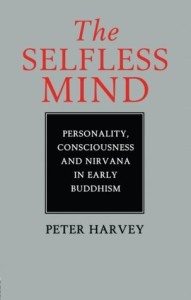Mahamati asked the Buddha: “What do you mean by ‘nirvana’?” The Buddha answered the question but he prefaced his answer with definitions of nirvana propounded by “followers of other paths.” These “wrong” answers are instructive because we can see that some of them seem to be correct! For followers of some paths, the Buddha said, nirvana is:
1. Cessation of the skandhas (the form, feeling, thought, choice, and consciousness that collectively form a sentient being);
2. Absence of worldly desires;
3. Impermanence of everything that is seen;
4. Non-arising of any and all mental activity;
5. Not thinking about past, future, or present states;
6. Putting an end to all sensation, like the extinguishing of a lamp or a fire or the destruction of a seed;
7. Not giving rise to projections;
8. Going from one place to another place, where thoughts of an external world cease, like when the wind stops blowing.
9. Eliminating the view of the knower and the known;
10. Seeing permanence and impermanence;
11. Seeing different forms as the cause that gives rise to suffering, and envisioning them as ending; unaware that these are nothing but perceptions of their own mind, they become afraid of forms and develop a deep desire to see no form, which they think of as nirvana;
12. Knowing what is indestructible;
13. The destruction of everything, including one’s self, person, being and life;
14. Seeing primordial nature and a cosmic being that produces that underlying nature, a primordial force which transforms into tendencies, and the tendencies then acting as the creator, which they then view as nirvana;
15. The end of good and bad karma:
16. The end of affliction;
17. Wisdom;
18. A supreme power responsible for birth and death;
19. Whatever leads to truth;
20. What nature gives rise to, such as the pattern in a peacock feather or a gemstone or the sharpness of a thorn;
21. Understanding the twenty-five realities;
22. Upholding the six virtues;
23. Something that exists;
24. Something that does not exist;
25. Knowing what exists and what does not exist;
26. Seeing the difference between nirvana and whatever one is aware of.
Some of these are quite subtle and I deliberately omitted some that were so subtle I didn’t know what was meant. For example, here is an omitted definition of nirvana: “There is no other cause of birth and death than giving birth to one another, and, due to their ignorance, they think this is nirvana.”
Well, it’s no longer deleted but that’s the type of definition of nirvana I deleted from this lengthy list.
Having listed what followers “of other paths” believed nirvana to be, the Buddha said:
“Nirvana, Mahamati, is not the destruction of anything…Mahamati, all these conceptions of nirvana suffer from duality…According to what I teach, Mahamati, nirvana means fully understanding that it is nothing but the perception of one’s own mind and it is not something that exists externally,,,(I think he is referring to emptiness). It is seeing what is real without falling prey to dualistic projections that are perceptions of one’s own mind and that are devoid (empty) of perceiver and perceived. It is not accepting the validity of any rule or measure or following anyone ignorant of reality.” (I wonder if I am “following” anyone on Twitter who is ignorant of reality? And how did the Buddha know about Twitter?)
That weak attempt at humor is injected just to give us a mental break from a rather lengthy discourse by the Buddha. Rested? Here goes how the Buddha wrapped up his definition of nirvana, obscure references and all:
“Rather, it is letting everything go in favor of attaining the personal realization of Buddha knowledge whereby one knows the two kinds of no-self, avoids the two afflictions, removes the two obstructions, gets free of the two kinds of death, advances to the higher stages and the profound Samadhi of the Illusory of the tathagata stage, and transcends the mind, the will, and conceptual consciousness. What I call nirvana, Mahamati, is what you and the other bodhisattvas should cultivate. And you should distance yourself at once from the views of nirvana held by followers of other paths.”
The quoted materials are from The Lankavatara Sutra as translated by Red Pine (Bill Porter). His notes explain the two deaths and the other obscure references. I purchased my copy from Amazon. His translation is priceless so whatever amount it costs is negligible by comparison. If you are not broke, buy it!
After all, reading a good book is nirvana. Perhaps the best book ever on the subject of no-self, because it draws from many sources, is The Selfless Mind.

